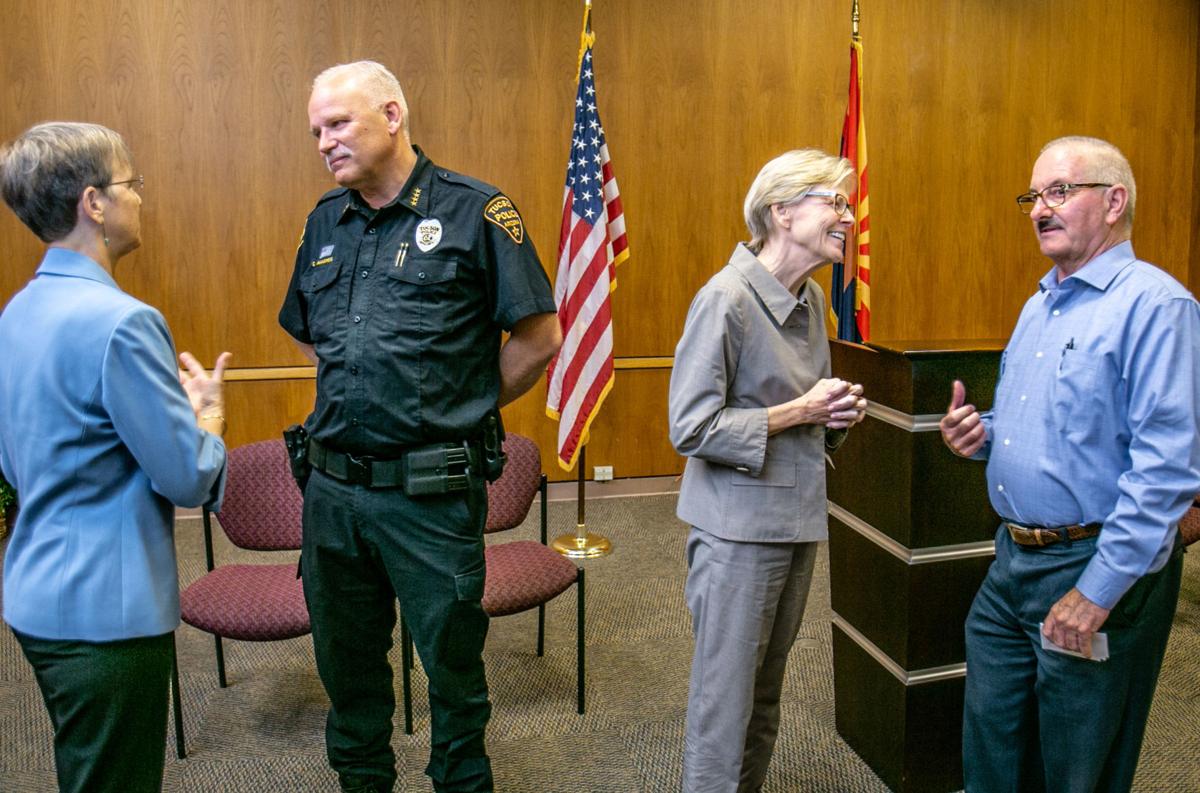A new $747,000 grant awarded to the Tucson Police Department will expand services and resources for Spanish-speaking victims of domestic violence and sexual assault.
The grant from the U.S. Department of Justice’s Office of Violence Against Women will be used to hire two detectives specifically to serve Spanish-speaking victims, to fund additional training for local nurses and medical-service providers, and to help create better resources for Spanish-speakers in areas of domestic violence and sexual assault.
“Throughout the country, I think, there’s really been a lacking of high-quality materials and resources for victims of these crimes who are Spanish-speaking,” said Tucson Police Department Chief Chris Magnus. “I think this is really innovative and important.”
The two new detectives will speak Spanish and be specially trained in the cultural dimensions of domestic and sexual violence in the Spanish-speaking community, but would be able to serve other individuals in need, Magnus said.
In 2017, TPD made nearly 2,000 domestic violence-related arrests, and 12 of the 46 first-degree murder cases playing out in Pima County Superior Court are domestic violence-related, according to data provided by the city and county.
“This grant was awarded to help ensure that crimes that primarily target women, such as sexual assault, domestic violence and stalking, are treated as serious criminal violations by the judicial system,” First Assistant U.S. Attorney Elizabeth Strange said at the news conference. “TPD and its partners have vowed to work together to enhance services and support for victims, and to bring their offenders to justice.”
The grant is the latest in a series of efforts to combat domestic violence in the Tucson area.
Two years ago, Pima County Attorney Barbara LaWall put together a coalition with representatives from TPD, the Pima County Sheriff’s Department and other local law enforcement agencies, Tucson Medical Center, behavioral health-care provider Codac, Southern Arizona Legal Aid, Step up to Justice and Emerge Center Against Domestic Abuse. The coalition has been working on a monthly basis to put together a collaborative community response, said Deputy Pima County Attorney Amelia Cramer.
In April, Tucson Foundations awarded $250,000 to the Pima County Attorney’s Office to develop and implement a new domestic violence risk assessment tool that’s being used by all local law enforcement agencies at crime scenes to determine the level of risk to victims.
In addition to hiring the new detectives and creating resources and materials for victims, the latest Justice Department grant will also cover training about strangulation, which Magnus called “an especially heinous component of altogether too many domestic and sexual assault crimes.”
The Pima County Attorney’s Office says there is a significant overlap of intimate partner domestic violence, sexual assault, strangulation and stalking.
“This grant is the first we’ve been awarded that really identifies that intersection and helps us address all those crimes together in a coordinated fashion,” Cramer said.
In the first year of the grant, Codac plans to train at least 11 nurses at Tucson Medical Center on sexual assault and strangulation examinations.
For years, TMC has collaborated with Codac’s Southern Arizona Center for Sexual Assault by providing exam space, said Codac President and CEO Dennis Regnier.
The goals for Years 2 and 3 are to reach a minimum of two of Tucson’s six other local hospitals to train nurses who have expressed an interest in learning more about sexual assault exams and strangulation, Regnier said.
The grant will also cover training for SACASA’s sexual assault examiners to increase their knowledge of medical Spanish and provide additional training to staffers to better serve survivors with culturally and linguistically competent services, Regnier said.
“There’s a strong belief that the number of individuals, if you look at the general population and the number of exams that are performed on Spanish-speaking individuals, that there’s plenty of room to improve in those areas,” Regnier said. “We look forward to doing that.”
The collaboration has applied for another federally funded domestic violence-related grant that would enable Pima County to expand its risk assessment tool to Tucson Medical Center for victims that come into the emergency room to be treated for domestic violence-related injuries without contacting police, Cramer said.
Officials expect to learn if they’ve been awarded the grant by early next month.
“The funding obtained through this grant ... is substantial and very much needed, but it’s not everything we need for a coordinated community response that can handle the volume of thousands of domestic violence and sexual assaults and stalking cases that we experience in Tucson and Pima County on an annual basis,” Cramer said.





